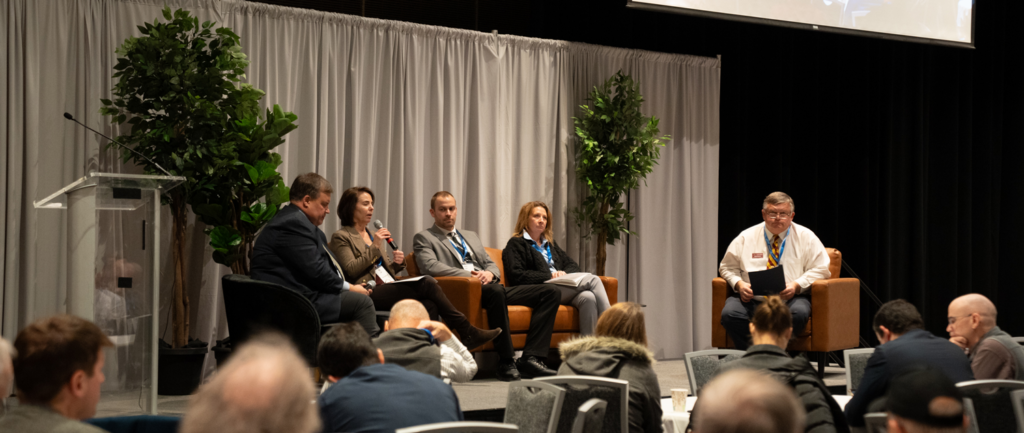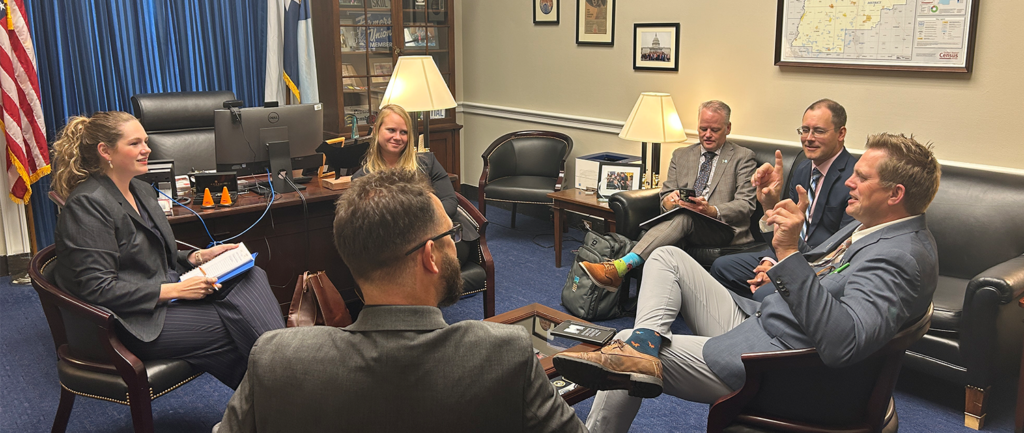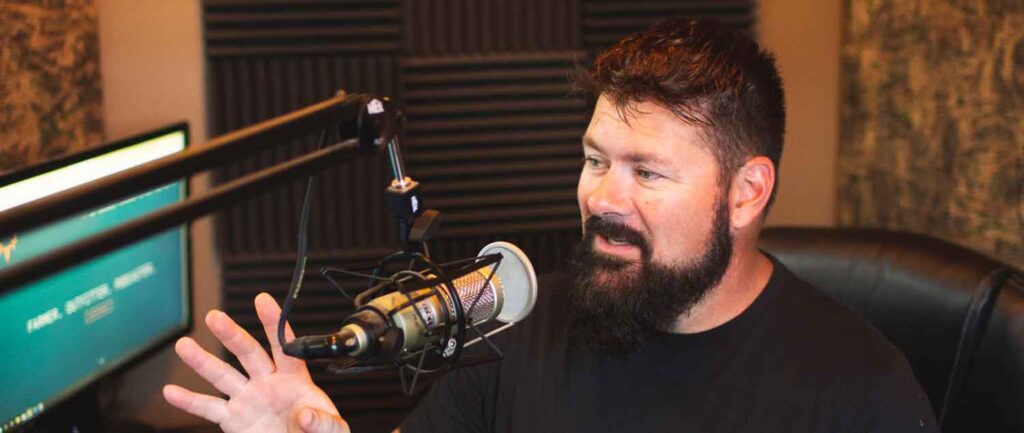MN AG EXPO 2020 promised something for everyone in agriculture, and delivered in spades. A full trade show floor covered all facets of agriculture – research, financing, water quality, health insurance, equipment, rural policies, value-added products and more.
“Think of the innovation around these booths here,” said Thursday’s morning keynote speaker, Dr. David Kohl. “This place is full!…This makes my day.”
The free, two-day event at the Mankato Civic Center began with the Minnesota Soybean Growers Association’s (MSGA) annual meeting. MSGA finalized its resolutions for 2020 and welcomed Rep. Jim Hagedorn. The congressman outlined his rural policies for 2020 – further solidifying trade deals, holding the EPA to account on the Renewable Fuel Standard and increasing federal funding for African Swine Fever.
“The EPA came out with a regulation that I’m not comfortable with,” Hagedorn told MSGA’s delegation. “There’s a real opportunity to keep expanding with biodiesel.”
Later in the meeting ceremony, MSGA Vice President Mike Skaug was named MSGA’s “Soy Advocate of the year.”
The show begins
More than 80 exhibitors packed the trade show floor, filling every available booth. MSGA’s booth highlighted its 2019-2020 advocacy wins and forecast, while the Minnesota Soybean Research & Council, an EXPO sponsor, promoted checkoff projects and trade issues. Dr. David Kee, MSR&PC’s research director, met with farmers in the Council’s booth to discuss production concerns and issues heading into the 2020 growing season.

“EXPO is always a great chance to visit with Minnesota growers over the winter season to showcase our latest checkoff-funded projects,” says MSR&PC Chair Cole Trebesch.
Wednesday’s trade show featured an appearance in the late afternoon by Gov. Tim Walz, who spoke about the challenges facing rural Minnesota in 2020. The governor, chair of the Governor’s Biofuels Coalition, says renewable fuels are an economic generator throughout Minnesota.
“We punch above our weight in Minnesota with biodiesel,” he said.
The governor also expressed cautious optimism following the signing of a “Phase One” trade with China and the USMCA passing the Senate.
“These are markets the folks in this room have established,” he says.
Following his speech, the governor toured the trade show floor. His final two visits were stops at MSGA’s booth, where he met with farmer leaders, followed by his first meeting with Specialty Soya & Grains Alliance Executive Director Eric Wenberg (both organizations are managed by Ag Management Solutions).

“I very much enjoyed our visit with the governor and greatly appreciate the time he spent hearing about our policy priorities for 2020,” says MSGA President Jamie Beyer.
Joining the Circus
After the first day of the trade show concluded, farmer leaders let their hair down for a good cause at MSGA’s Carnival silent auction and raffle fundraiser at the Loose Moose Saloon. All proceeds from the event benefited the advocacy organization’s lobbying efforts in St. Paul and D.C. Funds to MSGA’s “500 Club” went toward the MinnSoy Political Action Committee. Beyer donated a pair of VIP tickets to a Def Leppard concert in June; the winning bidder paid $2,000 for the Meet & Greet tickets. Minnesota Department of Agriculture Commissioner Thom Petersen also attended.
“The Carnival was a big success for MSGA, and a chance for everyone to relax and have some fun after our annual meeting,” said MSGA Executive Director Joe Smentek.
Day 2
Dr. Kohl, Virginia Tech professor emeritus, opened Thursday’s trade show with an educational and at times humorous presentation on the state of the agriculture economy. His theme throughout the hour-long keynote was centered around a “fresh start” in 2020.
“The world is very complex,” he said, “and sometimes it’s hard to get your arms around it.”
Kohl said low interest rates, resilient land values and stable energy prices are what separates the current ag economic climate from the 1980s. Eight out of every $10 spent on a farm are connected to energy, Kohl says.
“As we look at the economic environment, it’s going to be base hits, not home runs,” he said.
Still, Kohl is encouraged by the younger generation of farmers. This year, Kohl posits, may be a “fork in the road” for many farmers.
“Adversity creates opportunity,” he told a captive audience. “Focus on the things you can control, and manage the uncontrollables.”
Tax time
When it comes to taxes and estates, it is important for farmers to know their options to creating a financial plan for their future. Kaitlin Pals, a partner with longtime MN AG EXPO sponsor Gislason & Hunter, presented “Building Your Financial Plan – A Road Map to the Future.”
Throughout her presentation, Pals emphasized points concerning Minnesota estate tax concerning qualified small business and farm property exemptions and deductions, residential and agricultural homesteads and The SECURE Act.
“(The SECURE ACT) is a pretty big change that kind of went under everybody’s radar,” Pals said. “I know that farmers don’t tend to have most of their wealth in 401ks or IRAs – your 401Ks or IRAs are usually your land – but if you have an off-farm job, what the SECURE Act does is really important.’
Minnesota estate tax, both on a federal and state level, taxes estates at the time of a person’s death. However, it can a bit trickier when property is bought, sold or gifted, Pals says. It is important to know how Minnesota estate tax works to implement strategies to better assist with financial planning.
“It’s a bit tricky,” Pals said of Minnesota’s Estate Tax as it relates to gifting.
There are many components to be aware of with small business and farm property exemptions and deductions including the requirements and the potential heirs of the deceased.
Following exemptions, Pals, a self-proclaimed “property tax nerd,” highlighted some of the rules and regulations concerning residential and agricultural homesteads depicting the differences in the two.
Toward the end of the breakout session, attorney Christopher Kamath touched on the Secure Act by highlighting some of the recent changes and some of the main objectives that would be important for farmers to know.
For the “Food for Thought” closing keynote during Thursday’s luncheon, mental health consultant Cindra Kamphoff outlined her 10 strategies to gain a high performance mindset. In an echo of Kohl’s earlier statement about “managing the uncontrollables,” Kamphoff unveiled her APE theory – Attitude, Actions and Attention; Preparation, Passion and Purpose; and Effort, Emotions and Energy.
“You can’t control the things that are changing, like the weather. We can only control our response,” she says. “The sooner we move on from things we can’t control, the sooner we can move from the negativity and be the highest performers we can be.”







